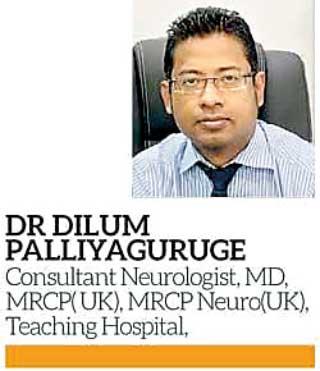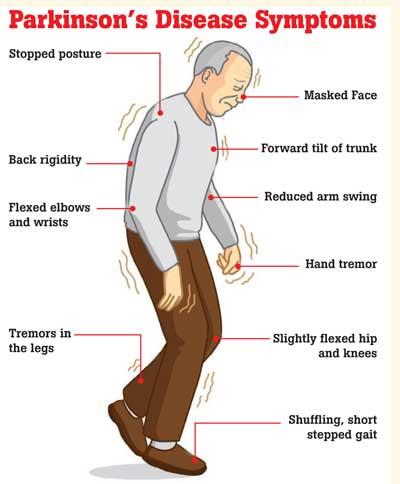16 Apr 2021 - {{hitsCtrl.values.hits}}

 “Parkinson’s Disease (PD) is a progressive neurodegenerative disorder which results from the loss of dopamine producing neurones in a part of your brain called Substantia Nigra. It has affected at least 5.2 million people worldwide with a significant male predominance. Although the exact cause for this condition is not evident, genetics and environmental factors have been found to be playing a huge role” explains Dr Dilum Palliyaguruge, Consultant Neurologist, MD, MRCP( UK), MRCP Neuro(UK), Teaching Hospital, Kurunegala.
“Parkinson’s Disease (PD) is a progressive neurodegenerative disorder which results from the loss of dopamine producing neurones in a part of your brain called Substantia Nigra. It has affected at least 5.2 million people worldwide with a significant male predominance. Although the exact cause for this condition is not evident, genetics and environmental factors have been found to be playing a huge role” explains Dr Dilum Palliyaguruge, Consultant Neurologist, MD, MRCP( UK), MRCP Neuro(UK), Teaching Hospital, Kurunegala.
PD presents with both motor and non-motor symptoms
The classic motor symptoms including tremors, rigidity, slowing of movements and difficulty in walking due to postural instability, emerge slowly and tend to worsen over time, giving rise to non-motor manifestations like neuropsychiatric, autonomic and sensory symptoms with sleep disorders. Rapid shuffling steps and stooped posture when walking with no arm swing, freezing of gait with brief arrests when the feet get stuck to the floor, especially on turning or changing direction, slurred monotonous quiet voice and mask-like expression-less face are among the other features which would help to identify patients with PD.
Neuro-psychiatric disabilities are common
Neuro-psychiatric disabilities including executive dysfunction where one would fail in planning, cognitive flexibility, abstract thinking, inhibiting inappropriate actions, initiating appropriate actions, working memory and controlling attention are among the earliest symptoms seen in affected individuals. Also Dementia, psychosis with visual hallucinations and delusions, depression, apathy, anxiety, Impulse Control Disorders, sleep disturbances and suicidal ideation can often be seen in individuals, further compromising the already established functional impairment bringing down the quality of life. This is the very reason why shedding light on this condition and getting immediate medical advice then and there is crucial.
“Depression is commoner in patients with PD with an average prevalence of 37.5% in Sri Lanka where advancedstages of the disease, anxiety, cognitive impairment, psychosis, long duration of illness, younger age of onset, female gender and requiring higher doses of medication to keep the disease under controlincrease the risk. Drug therapy with SSRI, SNRI and TCA combined with cognitive behavioural therapy and Electro convulsive therapy are beneficial in these individuals” explains Dr Palliyeguruge. Psychotic symptoms in PD has a prevalence of 15.8-75% with visual hallucinations being the commonest. Drug therapy should be commenced carefully as routine anti-psychotic medication has a chance of increasing the severity of motor symptoms in PD. Dementia in PD accounts for 31.3-75% and the vulnerability increases with age, presence of visual hallucinations and severity of motor symptoms. These patients usually show higher dysfunction in the domains of attention, executive and visuospatial functioning with lesser involvement of memory and language where Rivastigmine and Donepezil are known to be effective in the treatment. Additionally, anxiety disorder including panic disorders, social phobia and generalised anxiety disorder account for 19.8-67% of PD patients and can occur as a part of the pathology itself or a side effect of anti-parkinson medication.
A clinical diagnosis
“Being more of a clinical diagnosis, confirmed by a thorough history and neurological examination, Specific single-photon emission computerised tomography (SPECT) scan called ‘dopamine transporter scan’(DaTscan) is used to confirm PD in other parts of the world eventhough it is not available in Sri Lanka” says Dr Palliyeguruge.
PD is not completely curable
Early diagnosis and prompt initiation of treatment with a multidisciplinary approach and regular follow-ups play the hall-mark in slowing down the progression of PD. Levodopa is the single most effective therapy up to date and properly titrated doses synergized with Entercapone for prolonged action is helpful in keeping initial motor symptomsunder control”
World Parkinson’s day falls on April 11th, thus dedicating a moment in time to flock together with a common goal of raising awareness on the condition as well as the role of general public and health care providers in making real strides towards a better quality of life for the affected individuals. The theme for year 2021 is to uplift the mental health in patients with Parkinson’s disease in order to ensure an optimal quality of life. “So, with a sound awareness on all the aforementioned potential disabilities of PD, it is important to go ahead with a multidisciplinary approach with inputs from neurology, psychiatry, physiotherapy and occupational therapy to ensure a better prognosis in patients with PD” Dr Palliyeguruge underscores.
21 Dec 2024 26 minute ago
21 Dec 2024 2 hours ago
21 Dec 2024 5 hours ago
21 Dec 2024 5 hours ago
21 Dec 2024 6 hours ago